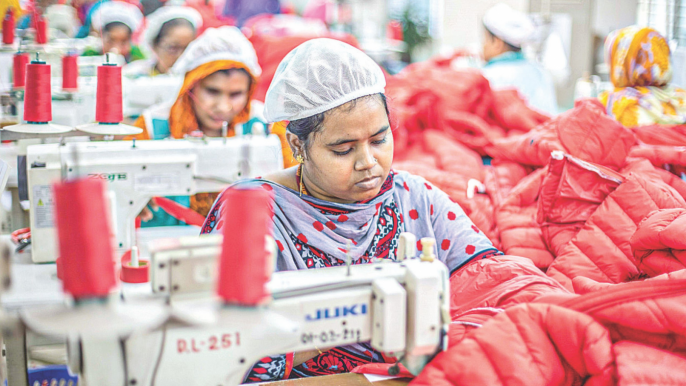In a letter, dated 20 November, sent to commerce ministry’s Senior Secretary Tapan Kanti Ghosh by Md Salim Reza, minister (commerce) at the Embassy of Bangladesh, the embassy said there are reasons to believe that Bangladesh may be one of the targets of the US’ recently released memorandum on labour rights.

The latest policy of the United States on labour rights warrants enough reasons for Bangladesh to be alarmed, the Bangladesh Embassy in Washington has said, stating that the issue should be “taken into cognizance with priority by concerned stakeholders”.
In a letter, dated 20 November, sent to commerce ministry’s Senior Secretary Tapan Kanti Ghosh by Md Salim Reza, minister (commerce) at the Embassy of Bangladesh, the embassy said there are reasons to believe that Bangladesh may be one of the targets of the US’ recently released memorandum on labour rights.
The letter, a copy of which was obtained by The Business Standard, said the policy would be another political tool to take measures on the pretext of labour issues.
“Though the ‘memorandum’ appears to be a global policy applicable for all countries, there are reasons to believe that Bangladesh may be one of the targets. Labour issues in Bangladesh were specifically quoted by the US secretary of state and acting secretary of labour at the launching ceremony [of the memorandum],” the letter said.
Acknowledging receipt of the letter from the Washington mission, Tapan Kanti Ghosh told The Business Standard over the phone yesterday, “The letter is not an alert, it is a normal communication.”
On 16 November, US Secretary of State Antony J Blinken announced the Presidential Memorandum on Advancing Worker Empowerment, Rights, and High Labor Standards Globally.
In the course of the announcement, Blinken said, “Those who threaten, intimidate, attack union leaders, labour rights defenders and labour organisations will be held accountable.”
One of the lines of efforts is steps like sanctions, trade penalties, and visa restrictions, he said.
The timing of the memorandum coincided with violent protests raging across Bangladesh’s RMG sector – the jewel in the country’s export crown, with exports reaching over $46.99 billion in FY23 – centring on the demand for a hike in workers’ minimum wage.
“As per the ‘memorandum’, the US foreign mission would directly interact/deal with labour issues, the policy may encourage interested US diplomats/missions to interfere in many internal/domestic issues,” the Bangladesh embassy letter to Tapan Kanti Ghosh said.
On how far-ranging the memorandum would be, the letter said, “It seems that there is scope for this policy to be imposed at individual, firm or state level if they anticipate/believe the labour rights are violated.”
“The political context of the ‘memorandum’ has many reasons to be alarmed. Politics is behind what is said about labour rights in the memorandum, and the US would try to use the political purpose in different ways,” the letter said.
Terming the memorandum to be a signal for Bangladesh, it said the US may try to take any measure described in it on the “excuse of labour issues. The memorandum may also have an impact on Bangladesh’s apparel sector…,” the letter said.
RMG exporters very concerned
Requesting anonymity, several leading apparel exporters expressed deep concern about the alarming message conveyed in the letter, indicating the government’s heightened awareness of the potential disruptions to trade that could materialise at any moment.
“The situation is akin to the tale of the boy who cried wolf. No one believes a liar, even when they speak the truth. We are deeply concerned and apprehensive about the potential consequences of this situation,” said one exporter.
He said, “This letter suggests that the government has received similar concerns from various institutions. Yet, they have already embarked on the election bandwagon, which is hurtling forward at a breakneck speed of 200km per hour. Now, we can only wait and see its repercussions.”
Another exporter said the government must prioritise strengthening its diplomatic ties with all trading partners, particularly those that are major export destinations.
“The only viable solution to resolve all issues lies in holding a free, fair, and participatory election that will be acceptable to our trading partners,” he said.
Meanwhile, the government and the election commission have said they are committed to holding a free and fair election.
Speaking to TBS, Faruque Hassan, president of the Bangladesh Garment Manufacturers and Exporters Association (BGMEA), said, “Despite our unwavering commitment to compliance with labour laws and buyers’ standards, Bangladesh is currently not exporting any apparel to the US under duty-free provisions. We wholeheartedly welcome recommendations for amending the labour law to further strengthen worker protection.”
“The labour law was amended three times in the last 10 years. If they [US] have identified any specific issue in the labour law, Bangladesh will try to address that,” he said.
Mentioning that the apparel industry is not violating any clause of the labour law, the BGMEA president said, “We are very confident they [US] will not take any steps to increase duty or impose sanctions. If they do so then it will largely affect our exports.”
He further mentioned that imposing duties or sanctions would lead to the closure of a significant number of factories, jeopardising the livelihoods of countless workers
















